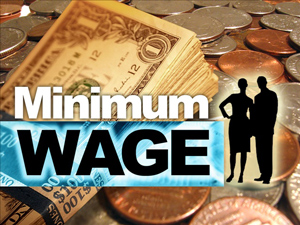Federal Minimum Wage Slightly Rises In 14 U.S. States
By PressTV.com | Last updated: Jan 13, 2016 - 9:57:57 AMWhat's your opinion on this article?

|
According to a report published by the National Conference of State Legislatures on earlier this month, California and Massachusetts saw the highest increase, with minimum wages rising from $9 to $10.
Meanwhile, South Dakota had the smallest increase, a nickel, with the minimum wages per hour standing now at $8.55. People in Arkansas experienced the second smallest increase with their wages going up from $7.50 to $8.
Other states affected by the move include Alaska, Colorado, Connecticut, Hawaii, Michigan, Nebraska, New York, Rhode Island, Vermont and West Virginia. The increases come following a series of “living wage” protests across many U.S. cities over low hourly wages.
In November of last year, thousands of protesters held demonstrations in 270 cities, demanding a $15-an-hour minimum wage and union rights for fast food workers. Food service workers now constitute the largest group of minimum-wage earners in the United States, according to the Bureau of Labor Statistics.
While the advocates of the decision argue a higher minimum wage would help poor people, the opponents assert that the move would have an impact on employment and company profits.
A federal minimum wage of up to $12 an hour, phased in over five years or so, “would not have a noticeable effect on employment,” said Alan Krueger, an economics professor at Princeton University and former chairman of Obama’s Council of Economic Advisers.
Mr. Krueger said that employers may cut jobs in response to an increase in a minimum wage, however, others may be able to fill job vacancies and reduce turnover, which would increase employment, but reduce profits. Over the past recent years, a large number of states and municipalities have acted independently in regard to wage floor policies.
Presently, 29 U.S. states plus the District of Columbia and about two dozen cities and counties have put their minimum wage at levels higher than the federal minimum. (PressTV)
INSIDE STORIES AND REVIEWS
-
-
About Harriett ... and the Negro Hollywood Road Show
By Rabiah Muhammad, Guest Columnist » Full Story -
Skepticism greets Jay-Z, NFL talk of inspiring change
By Bryan 18X Crawford and Richard B. Muhammad The Final Call Newspaper @TheFinalCall » Full Story -
The painful problem of Black girls and suicide
By Charlene Muhammad -National Correspondent- » Full Story -
Exploitation of Innocence - Report: Perceptions, policies hurting Black girls
By Charlene Muhammad -National Correspondent- » Full Story -
Big Ballin: Big ideas fuel a father’s Big Baller Brand and brash business sense
By Bryan Crawford -Contributing Writer- » Full Story






 Click Here Stay Connected!
Click Here Stay Connected!








